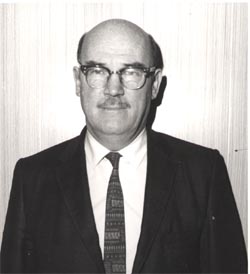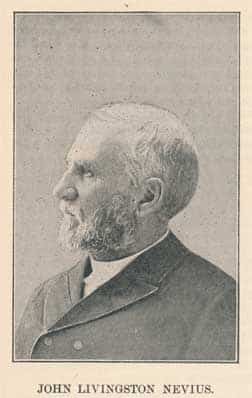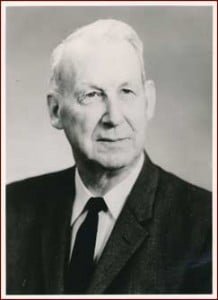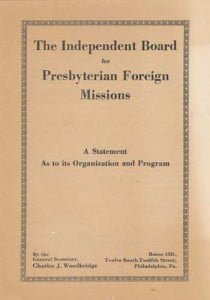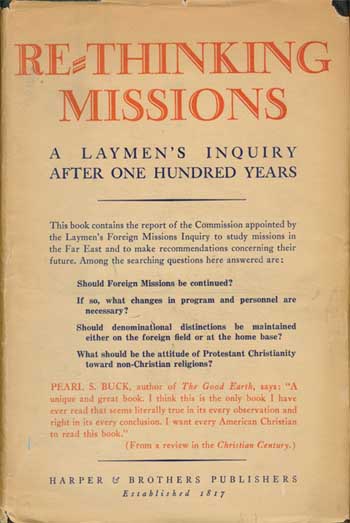Several years ago, the Rev. Howard Carlson, a minister in the Bible Presbyterian Church, shared a letter written by the father of Carl McIntire, addressed to the Rev. A.B. Dodd, a missionary to China. Both men were at that time members of the Presbyterian Church in the U.S.A. One of the real joys of an archivist’s job is getting to read other people’s mail. [that’s an old archivist’s joke, but with a strong measure of truth]. This letter offers a rare glimpse into a close friendship between two young men preparing for their respective lives of ministry, one in the distant fields of China, the other, by God’s providence, remaining at home.
—– Original Message —–
From: Howard Carlson
To: presbyterians-bpc@yahoogroups.com
Sent: Friday, May 26, 2006 10:55 PM
Subject: McIntire 03.doc
Rev. Carlson introduces this letter, saying that,
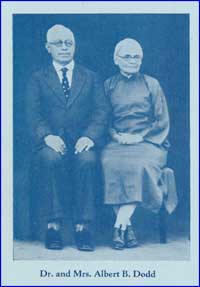 Bonnie, my wife is granddaughter of Albert Dodd, Missionary to China. He was a close friend of Curtis McIntire and the below letter was addressed to Dodd by the Rev. Curtis McIntire. They were to have gone to China together, but McIntire became ill the night before the ship left. Interesting thought – if Curtis McIntire had not become ill, Carl McIntire would have been born in and lived at least his early years in China.
Bonnie, my wife is granddaughter of Albert Dodd, Missionary to China. He was a close friend of Curtis McIntire and the below letter was addressed to Dodd by the Rev. Curtis McIntire. They were to have gone to China together, but McIntire became ill the night before the ship left. Interesting thought – if Curtis McIntire had not become ill, Carl McIntire would have been born in and lived at least his early years in China.
Then he presents a transcription of the letter from the Rev. Curtis McIntire:—
Albany, Mo July 11 1903
“My dear dear Dodd:
I have been looking for a letter from some time from you. I wrote you several weeks ago and perhaps you never received. I am hungry for you. I am up in the country 14 miles north of Albany as tomorrow is my day in our country chapel. I don’t know how many times I think of you. I have been thinking this morning on an evening sermon “And there shall be no night there.” It’s in the description of the new Jerusalem. No night there. Night is the time for sinning, for suffering, for sorrowing. Now night is taken for sin and its darkness but on those streets of gold with Him there will be no night there for He is the light thereof. Isn’t it grand. How I wish I could have a talk—one of the good old talks we used to have—one where we could open our hearts and minds to each other without the reserve we have to have with the rest of the world. I have been awfully busy this summer. Its hard to get disinterested people out of their old ways to a real activity of love for Him and the cause. But I have one church that is a joy to my heart. Thirty were present 1st Sunday, 60 the next, 70 [hard to read; could be 120 or 170] the next, and my next visit maybe the church will be too small. It takes all my time visiting. I’m afraid I haven’t spent enough time on my sermons. I can’t get time to write [no? rest?] a word of them. They would be lots better if I could. Now I feel like I have spent too much time with people for Him and too little time with Him for people. I wish I could be with Jesus as much as I want to and to Him what I desire, but the flesh is strong and I let things of my work be the temporary excuse. Oh I love Him and I am so untrue. Don’t you feel that way? Oh to be used wholly by Him. I remember one of the verses they sang at Winona last year which went something like this:
A band of faithful reapers we
Who gather for eternity
The golden sheaves of ripened grain
From every valley hill and plain
Our song is one the reapers sing
In honor of their Lord and King
The Master of the harvest wide
Who for a world of sinners died”
Now the chorus
To the harvest field away
For the Master calleth
There is work for all today
Ere the darkness falleth
Swiftly do the moments fly
Harvest days are going by
Going going going by.”
I suppose you are getting ready to be off for Persia. How I would like to see you! You could tell me the glories of the Conference at N.Y.
I can’t decide where I want to apply for China, Korea, India are before my mind. I wish you would tell me what you think I ought to do considering myself and the work in the places. I am attracted to the evangelistic work of Korea. But China appeals to me for its need of workers, the need which is darkness. I wouldn’t be so careful [uncertain] about making my choice but I ____ that is one of the ways God has of placing me and I am to exhaust my possibilities; then if it’s not the place He will cause the Board to overrule. Let me know what you think. I want the outside view and you can give it me.
I haven’t had a long letter from “Herb” for some time. I’m afraid he isn’t savoring [uncertain] the work as much as I did last year. I’m sorry I couldn’t meet for Commencement. But I learned you were still in the east. I saw Miss Forley [uncertain] and asked her to remember me to [you?uncertain]. And if you see her give my choicest regards to her and her sister for me.
I hope you get this before you start. I don’t know when you are to leave. I wish we could be together at Princeton again next year. Maybe we never will meet but oh the joy that in Heaven we shall meet and we shall know each other again in that place of beauty and happiness and holiness where we shall together see Him. I can’t tell you all my heart but it’s best in those words to you ‘Dear Dodd.’
Your own friend
C. Curtis McIntire”
Image source: Photograph of Mrs. & Mrs. A.B. Dodd, as found in The Independent Board Bulletin, 5.8 (December 1939), page 8.

